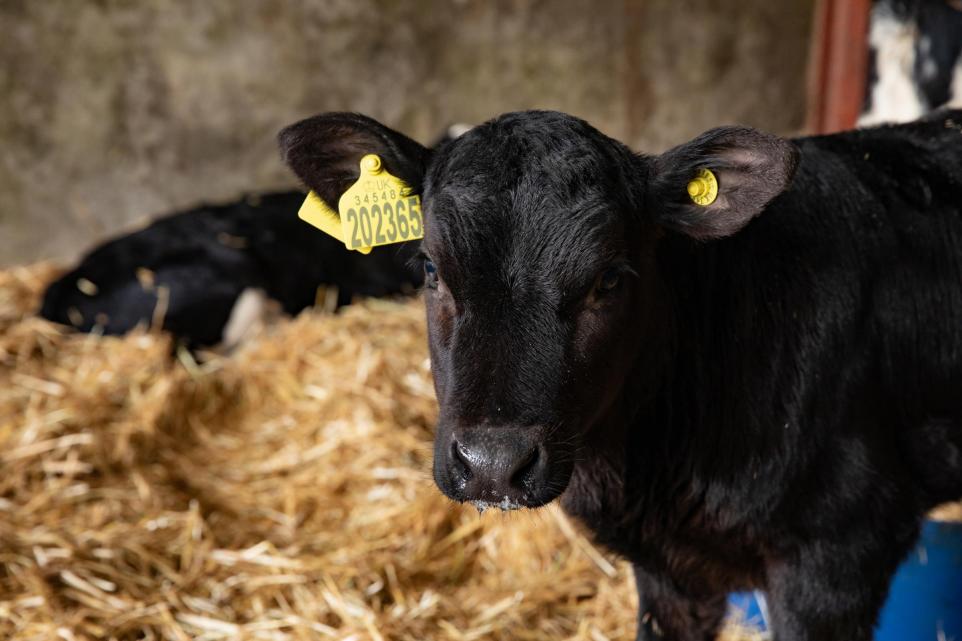Four in five dairy farmers have experienced cryptosporidiosis in their herds, with significant financial and welfare implications, according to new research.
A study conducted at Harper Adams University found that 84% of surveyed farmers had dealt with cryptosporidiosis outbreaks, with nearly 60% rating the severity as seven or higher, with 10 being the most severe.
The survey of 63 farmers across the UK highlighted financial losses ranging from £300 to £30,000, with 68% of respondents citing financial strain due to increased vet bills, extended rearing times, and lower sale values.
Almost three-quarters of respondents said affected calves were less profitable, with poor growth rates being the most common reason. This finding aligns with other UK studies, which demonstrate that calves infected within the first 16 days of life gain significantly less weight over six months, resulting in a potential £161 reduction in sale price per calf. Additional costs include increased labour for managing sick calves.
Cryptosporidiosis occurs when calves ingest the parasitic protozoan Cryptosporidium parvum (C. parvum), which produces vast numbers of encysted eggs shed in the faeces of infected animals. Calves between five days and two weeks of age are most affected, with symptoms including colic, reduced feed intake, watery scour, and dehydration.
The latest study was prompted by Alice Powell, a Ruminant Sales Specialist at Massey Feeds—a company offering specialist products to support calf health—after witnessing the devastating effects of C. parvum firsthand.
“On one of the farms I worked at, there were a lot of calf deaths due to C. parvum, and the calves were severely dehydrated. You could just smell it in the sheds. After testing, they found they had C. parvum, so they became very strict about cleaning, disinfecting, and colostrum management.”
Ms Powell says the farm even invested in new calf accommodation with non-permeable surfaces that were easier to clean and disinfect.
Her study revealed gaps in biosecurity and prevention. Some of the measures ranked as most important also had a high number of farmers stating they were not important. Some 28 farmers considered thorough cleaning of feeding equipment very important, while 18 stated it was not important. However, four in five farmers reported cleaning and disinfecting after an outbreak.
More than half of the respondents were using preventive measures, with cleaning equipment, good colostrum management, and correct calving protocols ranked as the most effective.
One issue raised was that many farmers were either using the wrong disinfectant or were unaware that only certain disinfectants are effective against cryptosporidiosis. Having the correct electrolyte protocol is also crucial. Some farmers mentioned adding electrolytes to milk, but this can affect the osmolality in the calf’s digestive system, leading to dehydration rather than rehydration. Electrolytes must be provided separately from milk feeds,” she said.
Dr Kat Baxter-Smith from MSD Animal Health highlights the multifactorial nature of managing infectious calf scour, adding: “No single solution exists, but good biosecurity, vaccination, nutrition, and hygiene help minimise problems.”
The research also gauged awareness of Bovilis Cryptium®, the first-ever vaccine for cryptosporidiosis. At the time of the survey, it was not available in the UK, having only been launched late last year. However, 81% of respondents said they would use it if it became available.
Farmers cited better calf welfare, reduced mortality, and improved productivity as key reasons for wanting access to the vaccine.
Administered to pregnant cows in the third trimester, the vaccine requires two doses given four to five weeks apart, with the final dose at least three weeks before calving. For subsequent pregnancies, a single booster dose is required.
“By vaccinating cows in late pregnancy, antibodies against C. parvum are raised in colostrum, reducing clinical signs of disease in newborn calves. Calves should receive at least three litres of colostrum within six hours of birth, and all calves should be fed colostrum and transition milk during the first five days of life. Calves gain protection against these pathogens by drinking the fortified colostrum from their vaccinated mothers,” explained Dr Baxter-Smith.
Source - https://www.thescottishfarmer.co.uk













